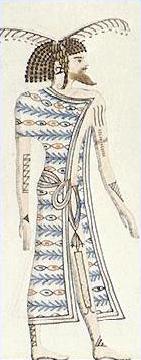Berbers
[[File:Berber_flag.svg
Berbers are an ethnic group indigenous to North Africa, particularly in the countries of Morocco, Algeria, Tunisia, Libya, Mali, and Niger. Known to themselves as the Amazigh (plural: Imazighen), which means "free people" or "free and noble men," the Berbers have a rich cultural history that dates back thousands of years, with their presence in North Africa predating the arrival of Arabs and the spread of Islam.
History[edit | edit source]
The history of the Berbers stretches back to prehistoric times, with evidence of their presence in North Africa from at least 10,000 BC. They have historically been a people of great diversity, living in a wide range of ecological settings from the coastal regions of the Mediterranean to the Sahara Desert. Over centuries, they have played a significant role in the history of the region, from the establishment of ancient civilizations to the spread of major religions. The Berbers were among the first to cultivate the land and establish sedentary communities in North Africa.
During the classical period, the Berbers formed several kingdoms and alliances, the most notable being the Mauri and the Numidians, who had significant interactions with the Roman Empire. With the Arab conquests of the 7th century, many Berbers converted to Islam and played a crucial role in the Islamic expansion across North Africa and into Europe, particularly during the Moorish invasion of the Iberian Peninsula.
Language[edit | edit source]
The Berbers speak various Amazigh languages, which belong to the Afro-Asiatic language family. These languages have traditionally been written in the Tifinagh script, although Arabic script and the Latin alphabet are also used today. Despite the widespread Arabization of North Africa, Berber languages have experienced a revival in recent years, with countries like Morocco and Algeria recognizing them as official or national languages alongside Arabic.
Culture[edit | edit source]
Berber culture is characterized by its rich oral traditions, including poetry, music, and storytelling. The Berbers are also known for their distinctive art and architecture, such as the prehistoric rock art of the Sahara and the iconic mud-brick architecture of the Kasbahs and Ksour in the Atlas Mountains. Traditional Berber music, which includes a variety of styles and instruments, plays a significant role in the cultural identity of the Amazigh people.
Berber society is traditionally organized in tribes and clans, with a strong emphasis on family and community ties. Social and cultural practices, including festivals and marriages, are important aspects of Berber life and have been preserved across generations.
Religion[edit | edit source]
Initially, the Berbers practiced a form of animism and polytheism. With the arrival of Phoenicians and later Romans, some converted to Christianity. The most significant religious change came with the Arab conquests, when the majority of Berbers gradually converted to Islam. Today, Islam is the predominant religion among the Berber population, although there are still small Jewish communities among certain Berber groups, such as the Jews of the Atlas Mountains.
Contemporary Issues[edit | edit source]
In modern times, Berbers have faced challenges related to cultural preservation and identity. Despite the recognition of Berber languages in some North African countries, many Berbers continue to advocate for greater cultural and political rights. Issues such as economic marginalization, linguistic and cultural preservation, and political representation are central to contemporary Berber activism.
Conclusion[edit | edit source]
The Berbers are a foundational element of North African history and culture. Despite the pressures of Arabization and modernization, they have maintained a distinct identity and continue to contribute significantly to the cultural and social landscape of the region.
This article is a ethnic-group stub. You can help WikiMD by expanding it!
Search WikiMD
Ad.Tired of being Overweight? Try W8MD's physician weight loss program.
Semaglutide (Ozempic / Wegovy and Tirzepatide (Mounjaro / Zepbound) available.
Advertise on WikiMD
|
WikiMD's Wellness Encyclopedia |
| Let Food Be Thy Medicine Medicine Thy Food - Hippocrates |
Translate this page: - East Asian
中文,
日本,
한국어,
South Asian
हिन्दी,
தமிழ்,
తెలుగు,
Urdu,
ಕನ್ನಡ,
Southeast Asian
Indonesian,
Vietnamese,
Thai,
မြန်မာဘာသာ,
বাংলা
European
español,
Deutsch,
français,
Greek,
português do Brasil,
polski,
română,
русский,
Nederlands,
norsk,
svenska,
suomi,
Italian
Middle Eastern & African
عربى,
Turkish,
Persian,
Hebrew,
Afrikaans,
isiZulu,
Kiswahili,
Other
Bulgarian,
Hungarian,
Czech,
Swedish,
മലയാളം,
मराठी,
ਪੰਜਾਬੀ,
ગુજરાતી,
Portuguese,
Ukrainian
Medical Disclaimer: WikiMD is not a substitute for professional medical advice. The information on WikiMD is provided as an information resource only, may be incorrect, outdated or misleading, and is not to be used or relied on for any diagnostic or treatment purposes. Please consult your health care provider before making any healthcare decisions or for guidance about a specific medical condition. WikiMD expressly disclaims responsibility, and shall have no liability, for any damages, loss, injury, or liability whatsoever suffered as a result of your reliance on the information contained in this site. By visiting this site you agree to the foregoing terms and conditions, which may from time to time be changed or supplemented by WikiMD. If you do not agree to the foregoing terms and conditions, you should not enter or use this site. See full disclaimer.
Credits:Most images are courtesy of Wikimedia commons, and templates, categories Wikipedia, licensed under CC BY SA or similar.
Contributors: Prab R. Tumpati, MD



